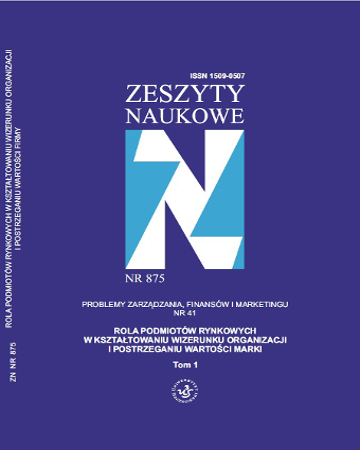
ISSN: 1509-0507
eISSN: 2353-2874
OAI
DOI: 10.18276/pzfm.2015.41/1-26



Issue archive /
ZN 875 PZFiM nr 41 t. 1
Critical Comments on CSR of Media Organisations – between Marketing and Mission
| Authors: |
Jan
Kreft
Uniwersytet Jagielloński |
| Keywords: | CSR media organisations image creation value of organization |
| Data publikacji całości: | 2015 |
| Page range: | 12 (327-338) |
Abstract
Public and commercial media enterprises adopt and communicate their CSR standards. It mainly refers to the largest television and radio broadcasting partnerships. However, in the field of their basic activities, which are namely: providing information, as well as creating and distributing media products, the aims and objectives defined by CSR are actually included in the functions and mission of media. Considering this fact, CSR in media organisations come as a multiplication of basic expectations and obligations of media. For media organisations (public media in particular) accepting and communicating CSR standards means accepting and communicating basic media functions with the consideration of methods and aims characteristic for commercial organisations. It may be interpreted as a form of creating an image which aims at the increase in value.
Download file
Article file
Bibliography
| 1. | CSRHub schema description, www.csrhub.com/content/csrhub-data-schema/. |
| 2. | Dahlsrud A. How corporate social responsibility is defined: an analysis of 37 definitions, “Corporate social responsibility and environmental management” 2008, Vol. 15, No. 1. |
| 3. | Deegan C., The legitimising effect of social and environmental disclosures – a theoretical foundation, “Accounting, Auditing and Accountability Journal” 2002, Vol. 15, No. 3. |
| 4. | Elhague E., Corporate managers’ operational discretion to sacrifice corporate profits in the public interest, in: Environmental protection and the social responsibility of firms, eds. B.L. Hay, R.N. Stavins, R.K. Vietor, RFF Press, Washington 2005. |
| 5. | Friedman M., The social responsibility of business is to increase its profits, New York Times 1970. |
| 6. | Henderson D., Misguided Virtue: False notions of corporate social responsibility, Hobart Paper 2001. |
| 7. | Kreft J., Za fasadą społeczności, Wyd. Uniwersytetu Jagiellońskiego, Kraków 2015. |
| 8. | Kreft J., Zagrożenia związane ze schyłkiem tradycyjnych mediów, in: Media publiczne wobec wyzwań współczesnego świata, Kancelaria Senatu. Biuro analiz i dokumentacji, Opinie i Ekspertyzy OE – 220, Warszawa, lipiec 2014. |
| 9. | Matten D., Moon J., Implicit and explicit. CSR: A conceptual framework for a comparative understanding of corporate social responsibility, “Academy of Management Review” 2008, Vol. 33, No. 2. |
| 10. | McQuail D., Media accountability and freedom of publication, Oxford University Press, Oxford 2003. |
| 11. | Mrozowski M., Media masowe. Władza, rozrywka i biznes, Oficyna Wyd. ASPRA – JR, Warszawa 2001. |
| 12. | Nasza filozofia CSR, www.grupapolsat.pl/pl/odpowiedzialny-biznes/nasza-filozofia-csr. |
| 13. | Norman W., MacDonald C., Getting to the bottom of “Triple Bottom Line”, “Business Ethics Quarterly” 2014, Vol. 14, No. 2. |
| 14. | Picard R.G., Media economics. Concepts and issues, Sage Publications, Newsbury Park – New Delhi, London 1989. |
| 15. | Porter M.E., Kramer M.R., Strategy & society: the link between competitive advantage and corporate social responsibility, “Harvard Business Review” 2006, Vol. 84, No. 12. |
| 16. | Rybak M., Społeczna odpowiedzialność biznesu – idea i rzeczywistość, “Gospodarka Narodowa” 2001, Vol. 3, No. 28. |
| 17. | The Broadcasting Act dated on 29th Dec.1992, Journal of Laws No. 04.253.2531 with later amendments. |
| 18. | Wright C.R., Mass communications. A sociological perspective, Radon Mouse, New York 1969. |
| 19. | Yin R.K., Case study research: design and methods, Sage Publications, Beverly Hills 1994. |